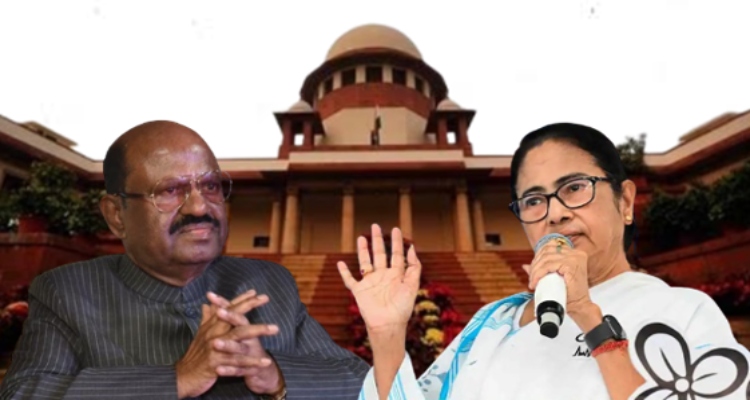
The West Bengal government has approached the Supreme Court against Governor CV Ananda Bose for withholding assent to eight bills.
The state government argues that the withholding of assent is affecting the welfare of West Bengal residents for whom the bills were passed.
The plea was mentioned before the Supreme Court on Friday for an urgent listing, and CJI Chandrachud agreed to consider the plea for early hearing. Advocate Astha Sharma, who filed the petition on behalf of the West Bengal government, presented the case.
“The conduct of the Governor not only threatens to defeat and subvert the very fundamentals and basic foundation of our Constitution, including the rule of law and democratic good governance, but further infringes upon the rights of the people of the State to the welfare measures sought to be implemented through the bills, thereby leading to the state failing in its duties as the parens patriae,” the petitioner stated.
The petition claims that the eight bills, passed since 2022, have been kept in limbo without any action, rendering the actions of the State Legislature otiose and directly affecting the residents of West Bengal. This, the petition argues, creates an unconstitutional state of affairs by the Constitutional post itself.
“The petitioner is constrained to move this Court invoking its extraordinary jurisdiction under Article 32 of the Constitution of India, aggrieved by the constitutional crisis created by the acts of omissions and commissions of the Governor of West Bengal with regard to eight key bills, for which assent under Article 200 of the Constitution of India has been withheld without reason and contrary to the constitutional mandate,” the petition said.
The West Bengal government has sought the Court to declare that the inaction, omission, delay, and failure to comply with the constitutional mandate by Governor CV Ananda Bose, through his Secretary/Respondent No. 1, regarding the consideration and assent of the bills passed and forwarded by the State Legislature, is unconstitutional, illegal, arbitrary, unreasonable, and constitutes a malafide exercise of power.
The petitioner has requested the Court to issue appropriate directions to the Governor of West Bengal through his Secretary to dispose of all pending bills, files, and government orders within a specified timeframe. Additionally, the petitioner seeks to establish guidelines stipulating the outer time limit for the Governor to consider bills passed by the Legislature and sent for assent under Article 200 of the Constitution of India, in light of the recommendations of the Sarkaria Commission.
The West Bengal government also seeks directions to lay down guidelines for the Governor’s consideration of files, policies, and government orders sent for signature in the discharge of his constitutional functions.
The State Legislature deliberated upon the provisions of the eight bills, which were passed and forwarded to the Governor’s office. Despite the passage of considerable time, these bills remain dormant. The state government asserts that a Governor, acting in gross disregard and violation of the Constitution’s provisions, cannot be considered to be discharging his duties properly. The state further argues that no part of the powers and duties of the Governor’s office permits him to refuse to deal with bills pending for almost two years while granting assent to other bills.
The eight bills in question are:
- The West Bengal University Laws (Amendment) Bill, 2022
- The West Bengal University of Animal and Fishery Sciences (Amendment) Bill, 2022
- The West Bengal Private University Laws (Amendment) Bill, 2022
- The West Bengal Krishi Viswavidyalaya Laws (Second Amendment) Bill, 2022
- The West Bengal University of Health Sciences (Amendment) Bill, 2022
- The Aliah University (Amendment) Bill, 2022
- The West Bengal Town and Country (Planning and Development) (Amendment) Bill, 2023
- The West Bengal University Laws (Amendment) Bill, 2023




